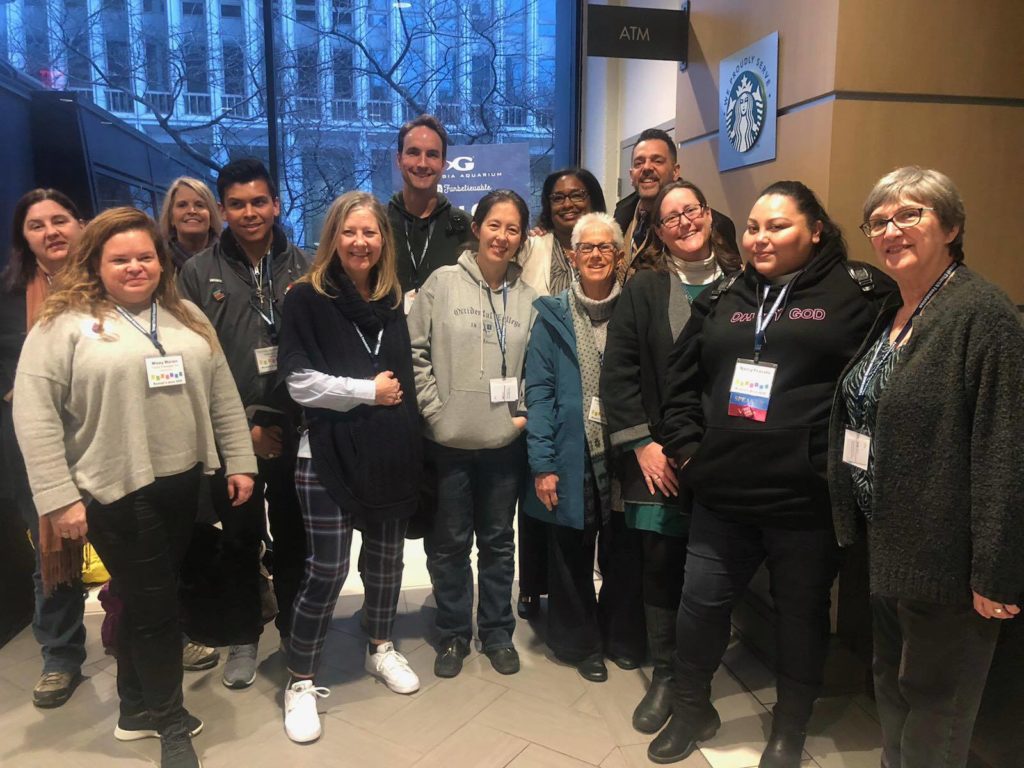
Episcopalians from the Diocese of Los Angeles gather during the “Rooted in Jesus” conference held Jan. 21 – 24 in Atlanta, Georgia.
Great preaching from Presiding Bishop Michael Curry and the Rev. William Barber II, leader of the Poor People’s Campaign, was just one of the reasons Kathryn Nishibayashi loved attending the recent Rooted in Jesus conference in Atlanta.
Nishibayashi, 37, a three-time Los Angeles General Convention deputy, said when she heard that the conference “would be like General Convention but without the legislation, I was like, sign me up.”
She and about a dozen Angelenos were among 1,400 people who attended the Jan. 21-24 conference, hosted by the Episcopal Church Foundation in partnership with The Episcopal Church and several other organizations. It included presentations and workshops on digital evangelism, civic engagement, environmental justice, liturgical renewal, preaching on current events and welcoming younger generations into the church.
The Rev. Rachel Nyback, rector of St. Cross, Hermosa Beach, also attended the conference. “Every year I debate if I want to go to the Forma conference, the evangelism conference, a preaching conference, or go get Asset Base Community Development training,” Nyback told the Episcopal News recently.
“The brilliant part of Rooted in Jesus is that all of the options were available, and I could pick and choose to meet the needs of my vocational call and the parish I serve,” she said. “The fact that my friends and colleagues across the church were talking about it also and I knew I would have time to visit (and learn!) with them also made it a bonus. The fact that Bishop Curry was going to have a revival while we were in town was icing on the cake.”
The presiding bishop ‘blew the roof off the place’
According to the Episcopal News Service, Barber, founder of the Moral Mondays movement, warned of the moral dangers of worshipping God without a conscience that responds to the needs of one’s neighbors. After his speech, between 2,000 and 3,000 people packed the arena at Clark Atlanta University for a rousing revival service featuring choirs, multilingual prayers, testimonials, and Michael Curry.
Seeing Curry and Barber together in an interview format session “was amazing and profound,” according to Nishibayashi. Barber’s address “was 45 minutes of amazing fire. (And) we got to hear the P.B. give a 45-minute sermon. He was blowing the roof off the place.”
She attended a variety of workshops, including one on evangelism that “was a good reminder that you don’t have to be an extrovert to be an evangelist.”
The opportunity for connection was also important. “There were people from this diocese that I didn’t know were going to be there, that I hadn’t seen here in L.A. in months.
“Going to these events is always worthwhile for me. It’s a good place for networking, a good place for reconnecting, both with other people and within my own self and faith journey and meeting other people along the same life path.”
Nyback said the conference gave her hope.
“Hope that the church is willing to address difficult issues. Hope that many are willing to see “church” in new ways,” she wrote. “Hope that we will try new things (thank you, TryTank, and if you aren’t on their mailing list you should be).”
TryTank is a joint project between the Virginia Theological Seminary and General Seminary to offer inventive approaches to equip leaders to reinvigorate the church. It is led by the Rev. Lorenzo Lebrija, former development director for the Diocese of Los Angeles.
Nyback said conference takeaways for her include: “a new Bible study method to use with vestry, a new framework to continue working on ABCD, discussions to have with our liturgical team about looking at our liturgical planning with some new lenses, paying attention to what makes the community I serve unique and how we can serve a wider community, conversations to have with the Vestry for vision planning, and much more that isn’t coming to mind at the moment, but will when I review my conference materials.”
In addition to discussions of experimental and creative new modes of ministry, there were also workshops and lectures that focused on the immediate challenges of the church, such as “Discovering the Vitality in Small and Rural Churches” and “Preaching in the Era of Division,” as well as lessons on the more practical elements of ministry, such as how to schedule a program year, write grant applications and build an endowment.
Curry and Barber recorded a podcast episode live from one of the conference ballrooms.
The conference closed with a packed Eucharist at nearby All Saints’ Episcopal Church, during which the Rev. Mark Jefferson echoed one of the recurring themes of the conference: to truly be followers of Jesus, we must “get our hands dirty” and abandon our notions of “comfortable Christianity.”
“We must understand that liberation in the context of oppression is embodied grace,” Jefferson said, to shouts of “Amen!”
Jefferson served as guest preacher at St. Mark’s, Upland on Sunday, Jan. 26.
Other Angelenos who attended the conference included: Karlyn Johnson Brown, member of All Saints’, Beverly Hills; the Rev. Laurel Coote, priest-in-charge at St. Mary’s Church (Mariposa), Los Angeles; the Rev. Kate Cress, rector of St. James’ Church, Los Angeles; Thomas Diaz of All Saints, Pasadena; the Rev. Nancy Frausto, associate rector at St. Luke’s Church, Long Beach; the Rev. Kelli Grace Kurtz, rector of All Saints, Riverside; Christopher Montella, priest-in-charge at St. Stephen’s Church, Santa Clarita; Missy Moran, member of St. Matthew’s, Pacific Palisades and a member of the Forma planning team; and Paula Walker and Gerti Reagan Garner, students at Bloy House.
More about the conference from Episcopal News Service is here.
